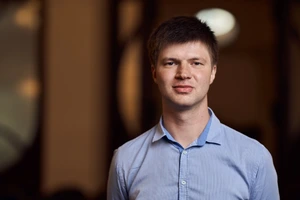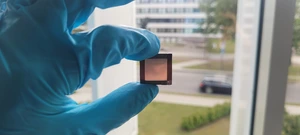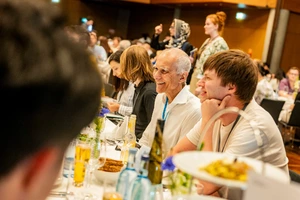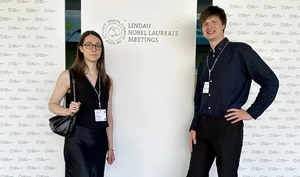Dr Artiom Magomedov, a chemistry researcher at Kaunas University of Technology, took part in the 74th Lindau Nobel Laureate Meeting in Germany – one of the world’s most prestigious events for young scientists. This year, only two Lithuanian researchers were selected to join the international gathering.
Every year, Nobel Prize laureates and around 600 carefully selected young scientists from around the world gather in Lindau to share their experiences, discuss and establish contacts. The selection process involves several stages, and the candidates must be exceptionally talented and actively engaged in scientific research.
Making solar cells cheaper, more efficient and stable
Dr Magomedov became interested in chemistry while still at school. One of the most significant events that led him into the field was participating in the Chemistry Olympiad in Year 9. He won an award for the best experiment there, which boosted his confidence and strengthened his motivation to delve deeper into the subject. The dedication and encouragement of his chemistry teacher provided a solid foundation for his future path.
Dr Magomedov’s primary research focus today is the development of organic materials for new solar cell technologies. This research aims to create solar cells that are more efficient, cheaper and more stable. In 2018, he and his colleagues developed materials that enable tandem solar cells to operate efficiently using a layer just one molecule thick to transport holes in the solar cell. These materials are still in use today.
“I always strive to ensure that research has an impact on people’s lives and is not just a report gathering dust in a drawer. However, it is also important to enjoy the research process itself and make steady progress towards discoveries. When working with molecules, changing one atom can significantly alter the properties – sometimes what should not work does, and what should work does not,” says Dr Magomedov.
MIT scientists use materials developed at KTU
The Lindau meeting provided Dr Magomedov with a unique opportunity to interact with Nobel Prize winners, both informally over dinner and in small group discussions. As he says himself, what makes the event stand out is the diversity of its participants in terms of their countries of origin, research areas and experiences. Being in such an environment encouraged him to re-evaluate his own career as a scientist.
In the event, the KTU chemist met colleagues working in similar fields, whom he is likely to meet again at international conferences. Sometimes conversations lead to unexpected discoveries: “It was nice to hear that the materials we are developing are being used in the work of the Moungi Bawendi Lab at MIT,” he says.
Nobel Prizes are often awarded long after significant discoveries have been made, when these technologies have already become an integral part of our everyday lives.
Advice for young scientists
As the Nobel Laureates’ Meeting is aimed at young scientists, many of the discussions focused on career stages for scientists, the path to becoming an independent researcher, and the challenges and opportunities of a researcher’s career. According to Dr Magomedov, who is a member of one of the Lithuanian Research Council’s committees, one of today’s significant issues for a scientist is maintaining a balance between academic freedom and responsibility while bearing in mind the influence of politics on research.
Also, he feels that science and research deserve more attention from both the media and the public.
“There are many excellent scientists in Lithuania who are recognised and well-known in their fields. However, due to the specific nature of scientific work, daily discoveries rarely reach a wide audience. Even the names of Nobel Prize winners are often unknown outside the narrow boundaries of scientific disciplines,” says Magomedov, Senior Researcher at one of the most productive chemistry research groups in Lithuania.
According to him, society still believes that chemistry is too complex a science. This preconception discourages the desire to learn and may deter young people from choosing a career in science. Therefore, he advises young researchers not to be discouraged by setbacks and not to miss opportunities.
“Behind every success story lie unsuccessful experiments, rejected applications and negative evaluations. The most important thing is to remember that the research process is enjoyable. You need patience, an interest in innovation and confidence in your ideas,” says Dr Magomedov, one of the two Lithuanians selected to meet Nobel Prize Laureates this year.





